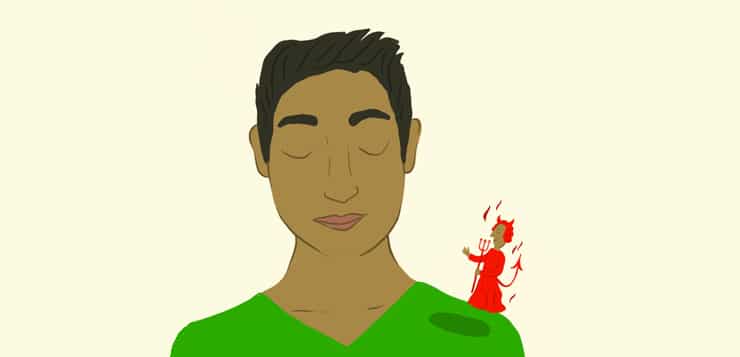Episode 2 of the Science of Happiness Podcast from the Greater Good Science Center featuring Steven Czifra in conversation with Dacher Keltner.
Quieting Your Inner Critic
Steven Czifra: The day started with me waking up and deciding I wasn’t going to go to school.
I went and found my friend who also never went to school and we were trying to figure out ways to get money for drugs.
So I went with him to the Hollywood Hills to find a Becker, Becker pull-out car stereo. We climbed into this Mercedes and it didn’t have a Becker but we were just looking for something we could steal. And the owner pulled up. And he was an off-duty LAPD.
I was feeling some fear around what it’s going to be like in jail. And yeah, I found out right away. The LAPD came and picked us up and took us to the Hollywood substation.
They couldn’t find my parents. So they took me to a holding cell. My first time in a cell…chained to a bench and they you know, I probably was chained to that bench for another eight hours.
It got cold, got damp, and all I know is I’m never getting out. I broke into some car. Pretty sure that means I’m doing life in prison. I don’t have nothing to compare it to. The cops are merciless, so they’re not giving me any kind of comfort. Like, hey don’t worry about it, buddy.
It was really dark, really lonely, really scary time. It was just like the darkest night of my life. You know the dark night of the soul.
I was nine years old.
Dacher Keltner: Since that night in jail, Steven Cfizra spent the better part of two decades in and out of prison…eight of those in solitary confinement.
He’s now a graduate student at UC Berkeley and mentors other previously incarcerated students through an initiative on campus called Underground Scholars.
Steven joins us today as our “Happiness Guinea Pig.”
I’m Dacher Keltner, and in each episode of The Science of Happiness podcast, we focus on a different research-tested practice for increasing happiness, resilience, kindness, and connection. And we have a guest like Steven try out that practice and tell us about their experience. Then we explore the science behind it.
Steven, thanks for joining us today. So the happiness practice you chose to do is something called the “self-compassionate letter.” Why did you choose to do that one?
Steven Czifra: I’m really hard on myself. A lot. And it’s an academic mental exercise to figure out why I shouldn’t do that. But if you live in self-loathing, you can read all the books you want on self-compassion, it doesn’t add up to anything. So I don’t have a lot of self-compassion but it’s a skill like any other.
If you live in self-loathing, you can read all the books you want on self-compassion, it doesn’t add up to anything.
So I wrote a letter, to me, as if I wasn’t me, but if I was somebody else who I was mentoring, what I would say to somebody who had this problem. And I am a mentor to some people so I have a little bit of experience talking people down.
Dacher Keltner: Yeah I’m really curious how… I mean one of the really interesting things about self-compassion is the perspective that you adopt on your shortcomings or failings or things that we’re embarrassed or ashamed about. What was the perspective on that, that you took?
Steven Czifra: Well usually when I’m trying to find guidance I hear my own mentor’s voice. His name’s Larry. He’s a retired English professor. He’s basically the dad I always wanted. Really kind and and warm and loving and gay and generous. He’s a Shakespeare scholar and I love Shakespeare. Shakespeare got me through prison.
Dacher Keltner: So Steven, will you share part of your letter with us.
Steven Czifra: You are not inadequate. The fact is everyone feels scared at some point in their lives. Most people feel inadequate at times — that you experience these feelings daily, constantly, and can still show up for your family and community and for yourself as a more accurate measure of who you are. People are not defined by their feelings or actions. But if you must know yourself as something, you should know that you are as deserving of feeling OK as anyone. You are as qualified to take credit for your life as anyone. Sure, you and your benefits and resources, even internal resources, are derived from the past efforts of others. So then say that. Say to yourself and to those unfortunates who try to compliment you, “thank you.” You could have chosen differently.
Dacher Keltner: Coming out of the childhood that you had, and I have so much admiration for where you are today, you could have chosen a lot of different practices right? But you chose self-compassion.
Steven Czifra: This is what Larry would say to me. He says it a lot and these are my words but his idea and that is that… I had a rough going. And that I didn’t get what I had coming to me, which was care and security and the kinds of things we give children. And that had a that had an effect on me that is going to be a part of me for the rest of my life. And that I can, in understanding that I can, I guess, give myself a break.
Dacher Keltner: So when you when you read this and self-compassion letter and you took in his voice and put it to work what happened? How did it make you feel?
Steven Czifra: Well, I’ll say that when I wrote it I turned everything off. So it was pretty academic.
Dacher Keltner: What things are you turning off to get through the prose?
Steven Czifra: Well just my emotional availability. I’ll say when I read it for the recording, then I felt some emotional stirrings. I did imagine that someone, as I mentioned Larry, just shows up — he’s the little angel on my shoulder and I don’t really have a devil on the other shoulder. I am the devil. And so it’s just Larry. That’s all I got.
Dacher Keltner: You know when you engage in these self-compassion practices you get a sense of where you are connected to the larger humanity. Did those kind of f thoughts move through your mind? Just taking an easier look at your past failures or sensing a deeper connection to kindred spirits?
Steven Czifra: I have — what you’re describing is spiritual maturity, right? It’s understanding that everybody’s having a human experience. We’re all having the human experience and we have redeemable things and we have things that suck. My mom was not a great mom and so I’m constantly trying to find a way to be generous with that. She had a really rough time growing up.
We’re all having the human experience and we have redeemable things and we have things that suck. My mom was not a great mom and so I’m constantly trying to find a way to be generous with that. She had a really rough time growing up.
Dacher Keltner: So one of the really interesting things to hear you talk about — tough childhood, on the run from the cops, getting out of school, you’re in prison — is when you come out, there is this wonder about outside. And it almost sounds like, when we study awe in our lab people are amazed by the details of life.
Do you feel that? Is there like a wonder at everyday life that you feel comes from first being inside and now being outside?
Steven Czifra: For the most part, I’m just marveling in the ordinary, especially in the morning. Once I got out of prison I thought this life stuff is scary. But there’s never a moment in any day where I don’t lose the gratitude of like, seeing grass, or a squirrel, or a cat, or standing in Safeway… One of my favorite things to do is to be behind somebody in Safeway who’s impatient because somebody is writing a check, or using their WIC checks, or has three kids, or is old.
It’s like oh my god, like this person is standing in a historically significant moment in time where they can walk into a room that’s filled with ingredients from all over the world for dirt cheap and make any kind of cuisine they want for five bucks and they’re mad. How disconnected from reality can you be?
Dacher Keltner: Yeah, absolutely. There’s this great emotion that we study in the science of happiness called elevation, which is about when you’re inspired by other people and where they come from and what they do. The work that you do in many different realms elevates me and many people here. So thanks for being here.
Steven Czifra: Thanks, thanks for saying that, Dacher. I appreciate it.
If you want to try the self-compassionate letter practice, and other practices like it, you’ll find simple instructions at our website Greater Good in Action.
Dacher Keltner: So what does writing a self-compassion letter do? How can it actually improve your well-being and happiness?
Studies show that people who respond with compassion to their own flaws and setbacks — rather than beating themselves up about them — experience greater physical and mental health, and they seem to bounce back more easily from stress and challenges.
Joining me today to talk about the science of self-compassion is my colleague at UC Berkeley, professor Serena Chen, who has studied self-compassion for years. Serena, thanks for being here.
Serena Chen: Thanks for having me.
Dacher Keltner: So Serena, today we’re going to talk about self-compassion, which is, in the science of happiness, has really become a mini movement onto its own. How do you define self-compassion?
Serena Chen: It’s about being kind and understanding to yourself like you would your friends so that resonates easily with people.
A second part is really recognizing that we are all human and we’re all similar and that we all make mistakes — bad things happen, they’re inevitable, and that makes us all similar, it’s a connecting experience, bad things. And the third part is more emotional in the sense that it’s about striking a balance between absolutely acknowledging when something bad happens that it’s bad. Not ignoring that it sucks and it doesn’t feel good but not overreacting, not overblowing the negativity — so some sort of balanced sense of what’s going on.
Dacher Keltner: Pretty timely today when you think about all the pressure on people the anxiety.
So as you bring self-compassion into the lab, tell me about some of its benefits. What’s one of your key findings in the experimental study of self-compassion?
Serena Chen: One of our key findings is showing that you can experimentally induce self-compassion and lead people to be more motivated to improve. So to give you just one example, in a study we had everybody have a failure experience, they all failed this test that was really hard. And then half the people got put in a self-compassionate condition where they were sort of told, Oh this is a tough test. A lot of people fail. This is a common experience for this test. Or a self-esteem condition. They were told, even though this test might have been hard you must be really smart since you’re here at Berkeley.
And then all participants were given an opportunity to take another test and they were given unlimited time to prepare for the test. We find that people in the self-compassion condition who were reminded everyone fails at times, study longer for the subsequent tests than those who actually were reminded of how smart they are.
So what that study shows is that in real behavioral concrete ways, when people treat themselves compassionately in the face of failure they’re actually motivated to do better the next time.
Dacher Keltner: One recent study you focused on regret. I love that study because in the middle of life regrets start appearing…
Serena Chen: We have people recall in vivid detail something negative, something they would see as negative, some sort of setback in their life, a challenge, a failure or what have you. It’s totally self-defined. Needs to matter to people themselves. And we have them speak to themselves or write to themselves in a self-compassionate way as if you were speaking to a friend. How would you respond? Compared to a self-esteem condition where we tell them to respond to that setback in a way that validates their positive qualities.
People report greater acceptance of their regret, that this is something that happened that they were responsible for, and greater desire to not let that regrettable experience repeat itself. And this is something that you don’t see happening and the self-esteem condition. So it’s not just making people feel happy or good about themselves right? It’s really a unique effect that has to do with being self-compassionate.
Dacher Keltner: One of the really interesting dimensions to this self-compassion science is you know in your experiments you have people take on the voice of a friend in looking at the self. Why do you do that?
Serena Chen: Well, there’s two reasons at least. One of them is that people are much better or more experienced at being kind and understanding to other people, to friends, and so it makes the task easier. But the other reason that I think it’s effective has a lot to do with how when you step away from first person perspective you take a third person perspective, you’re dampening down the emotionality of the experience. All the negative affect that you could feel, you’re able to literally distance yourself, have a calmer and more balanced perspective. So I think it helps in that cognitive emotional way as well to look at the situation from somebody else’s perspective — pretend you’re looking at it outside of yourself.
Dacher Keltner: Thanks for being here Serena.
Serena Chen: Thanks for having me.
Produced by the Greater Good Science Center and PRI. Episode 2 of the Science of Happiness Podcast by the Greater Good Science Center, featuring Steven Czifra in conversation with Dacher Keltner.
https://www.mindful.org/basic-meditation-tame-inner-critic/
https://www.mindful.org/dont-fall-into-the-self-esteem-trap-try-a-little-self-kindness/








